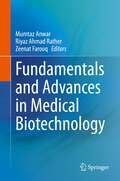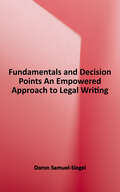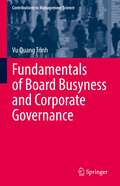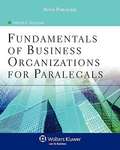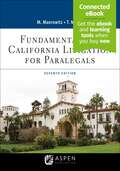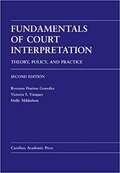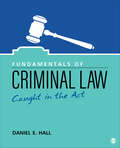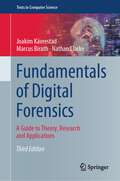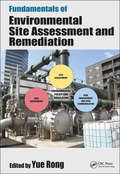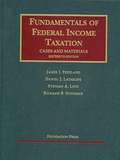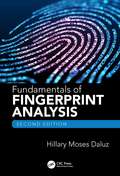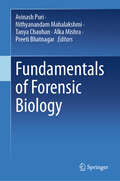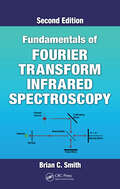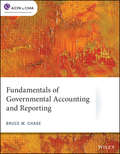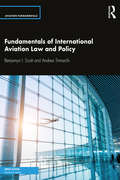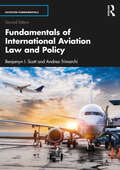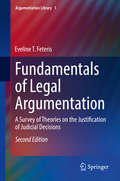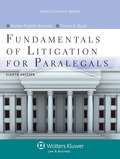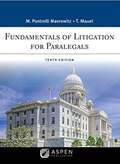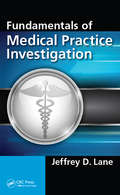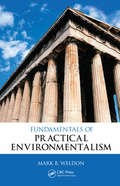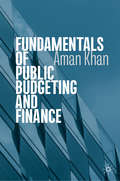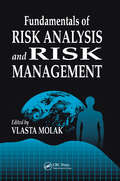- Table View
- List View
Fundamentals and Advances in Medical Biotechnology
by Mumtaz Anwar Riyaz Ahmad Rather Zeenat FarooqThis book serves as an introduction to the concepts of medical biotechnology, with great details about fundamentals and early disciplines of study as well as emerging fields and the latest research. The book follows a chronological order from the earliest discoveries and breakthroughs of medical biotechnology to the latest areas of study. The book contains up-to-date citations for each chapter and section, which makes it easy for the reader to understand the concept and also to follow the latest developments in the particular area. It is an ideal book for undergraduate and graduate students who aspire to derive basic knowledge and are also keen on learning about the latest advancements in the field of medical biotechnology.
Fundamentals and Decision Points: An Empowered Approach to Legal Writing
by Doron Samuel-SiegelThis concise text frames legal writing as a process built around a set of predictable, principle-driven decision points. It empowers students to navigate those decision points with confidence because, rather than treating memos, briefs, and letters as skillsets unto themselves, it teaches a consistent process applicable to all documents students are likely to face throughout their careers. <P><P>Centering both traditional and critical approaches, as well as intercultural communication skills, the book helps students learn the fundamentals of deductive reasoning and CREAC, while also introducing analytical and rhetorical tools for when existing laws or conventions are likely to produce injustice. Three foundational chapters describe step-by-step processes for conducting legal analysis, legal writing, and legal citation, respectively. The remaining chapters equip students to practice applying the fundamental processes to common settings such as predictive writing for law-trained audiences (memos, letters, and emails); oral presentations; advisory writing for lay clients; and persuasive writing to opposing parties and decision-makers. Finally, the Appendix provides robustly annotated examples including a legal memorandum, an executive summary email, a letter to a lay client, and a trial court brief.
Fundamentals of Board Busyness and Corporate Governance (Contributions to Management Science)
by Vu Quang TrinhThis book delivers the essential concepts and theoretical perspectives of corporate governance and board busyness. It uses the unique context of a dual banking system to capture the potential effects of such aspects on corporate outcomes. Board busyness refers to a board with a substantial proportion of “busy” members who hold multiple directorships. In most cases, directors are “over-boarded,” which means that they hold an excessive number of seats across different boards. The busyness of individuals is gauged to infer their monitoring and recommending abilities through their involvement, efforts, knowledge, skills, and experience, and hence, their behaviour in financial contexts. Yet an assessment of board busyness and its effects is challenging and inconclusive concerning the two opposing arguments surrounding this board attribute: reputation and busyness. The book is the first to thoroughly discuss this up-to-date concept within the dual banking system, and it is designed to help new researchers in this field and students boost their research and academic careers.
Fundamentals of Business Organizations for Paralegals (3rd Edition)
by Deborah E. BouchouxFundamentals of Business Organizations for Paralegals, Third Edition, offers a concise treatment of all of the forms of business organizations in the United States. The author provides thorough, succinct treatment of all pertinent topics, making this book the ideal choice for instructors who teach a shorter course and need a text that covers critical topics with a more straightforward approach. Attentive To The fundamentals paralegal students need to know, this concise paperback provides: a basic and thorough understanding of all the various types of business organizations in a direct and concise format a discussion of each form of business organization, including the nature of the entity, advantages and disadvantages, formation of the entity, operation and management, transferability of ownership, dissolution, and tax consequences more in-depth treatment of Limited Liability Partnerships and Limited Liability Companies than other texts useful exhibits and charts that highlight important topics and sample forms that are integrated with the textual discussion throughout the book Internet resources in each chapter that direct readers to Internet sites that may provide additional information, forms, or agreements Key Terms defined in the margins for easy reference, practice tips in each chapter that provide pragmatic information for paralegals, lists of relevant websites and of tasks commonly performed by paralegals, and a complete glossary that provides an easy reference for terminology Case Illustrations -- brief summaries of cases that illustrate one of the concepts or topics addressed in the chapter Discussion Questions in each chapter that stimulate class discussion and ensure that students Understand The material a complete ancillary package, including an instructor's manual with a test bank and PowerPoint slides. The Instructor's Manual will also provide additional forms, such as tax forms, not included in the text New to Third Edition: each chapter includes all new discussion questions, Internet questions, and Case Illustrations Chapter 6 discusses Revised Uniform Limited Liability Company Act Chapter 10 discusses new trends in corporate governance, such as the move toward electing boards of directors by majority rather than plurality vote, The move toward eliminating staggered or classified boards of directors, new SEC rules and regulations, And The availability of proxy materials on the Internet coverage of the 2008 financial crisis Clear and To The point, Fundamentals of Business Organizations for Paralegals is an excellent, concise treatment of the basics of business organizations, providing students with a thorough understanding of essential topics.
Fundamentals of California Litigation for Paralegals (Aspen Paralegal Series)
by Thomas A. Mauet Marlene A. MaerowitzFundamentals of Litigation for California Paralegals, Seventh Edition offers a complete understanding of the litigation process from the time the client walks into the office through to trial and post-judgment, including settlements and alternative forms of resolutions. Tailored to California practice, the authors’ successful, balanced approach presents a complete overview of the litigation process, with clear explanations and examples of the rules and procedures. <p><p>The text’s flexible organization allows the instructor to easily pick and choose the areas to cover in the course. Intended specifically for California paralegals, each chapter references specific California statutes, and relevant California forms are included throughout the book.
Fundamentals of Court Interpretation: Theory, Policy and Practice
by Holly Mikkelson Roseann D. Gonzalez Victoria F. VasquezThis volume explores court interpreting from legal, linguistic, and pragmatic vantages. Because of the growing use of interpreters, there is an increasing demand for guidelines on how to utilize them appropriately in court proceedings, and this book provides guidance for the judiciary, attorneys, and other court personnel while standardizing practice among court interpreters themselves. <p><p> The new edition of the book, which has become the standard reference book worldwide, features separate guidance chapters for judges and lawyers, detailed information on title VI regulations and standards for courts and prosecutorial agencies, a comprehensive review of U.S. language policy, and the latest findings of research on interpreting.
Fundamentals of Criminal Law: Caught in the Act
by Daniel E. HallFundamentals of Criminal Law: Caught in the Act offers an accessible, comprehensive and contemporary survey of the field. With a focus on the current state of the law and on contemporary problems that matter to students, all presented in way that piques curiosity and interest, this book will cover topics such as hate crime, free speech, human trafficking, firearms possession and use, self-defense, cybercrime, and Internet stalking. Author Daniel E. Hall has written engaging content to help students think critically about how criminal acts are defined, defended, and determined. Built around a conversational narrative, the concepts and optional case studies connect to real life. There is also a clear emphasis on cases and examples that are relevant to criminal justice majors and future practitioners, such as litigation against police and correctional officers, terrorism, the death penalty, corporal punishment in prisons, etc. Try these free Criminal Law activities in your class This title is accompanied by a complete teaching and learning package. Contact your SAGE representative to request a demo. Digital Option / Courseware SAGE Vantage is an intuitive digital platform that delivers this text’s content and course materials in a learning experience that offers auto-graded assignments and interactive multimedia tools, all carefully designed to ignite student engagement and drive critical thinking. Built with you and your students in mind, it offers simple course set-up and enables students to better prepare for class. Learn more. LMS Cartridge (formerly known as SAGE Coursepacks): Import this title’s instructor resources into your school’s learning management system (LMS) and save time. Don’t use an LMS? You can still access all of the same online resources for this title via the password-protected Instructor Resource Site. Learn more.
Fundamentals of Criminal Law: Caught in the Act
by Daniel E. HallFundamentals of Criminal Law: Caught in the Act offers an accessible, comprehensive and contemporary survey of the field. With a focus on the current state of the law and on contemporary problems that matter to students, all presented in way that piques curiosity and interest, this book will cover topics such as hate crime, free speech, human trafficking, firearms possession and use, self-defense, cybercrime, and Internet stalking. Author Daniel E. Hall has written engaging content to help students think critically about how criminal acts are defined, defended, and determined. Built around a conversational narrative, the concepts and optional case studies connect to real life. There is also a clear emphasis on cases and examples that are relevant to criminal justice majors and future practitioners, such as litigation against police and correctional officers, terrorism, the death penalty, corporal punishment in prisons, etc. Try these free Criminal Law activities in your class This title is accompanied by a complete teaching and learning package. Contact your SAGE representative to request a demo. Digital Option / Courseware SAGE Vantage is an intuitive digital platform that delivers this text’s content and course materials in a learning experience that offers auto-graded assignments and interactive multimedia tools, all carefully designed to ignite student engagement and drive critical thinking. Built with you and your students in mind, it offers simple course set-up and enables students to better prepare for class. Learn more. LMS Cartridge (formerly known as SAGE Coursepacks): Import this title’s instructor resources into your school’s learning management system (LMS) and save time. Don’t use an LMS? You can still access all of the same online resources for this title via the password-protected Instructor Resource Site. Learn more.
Fundamentals of Digital Forensics: A Guide to Theory, Research and Applications (Texts in Computer Science)
by Nathan Clarke Joakim Kävrestad Marcus BirathThis textbook describes the theory and methodology of digital forensic examinations, presenting examples developed in collaboration with police authorities to ensure relevance to real-world practice. The coverage includes discussions on forensic artifacts and constraints, as well as forensic tools used for law enforcement and in the corporate sector. Emphasis is placed on reinforcing sound forensic thinking, and gaining experience in common tasks through hands-on exercises.This enhanced third edition describes practical digital forensics with open-source tools and includes an outline of current challenges and research directions.Topics and features:Outlines what computer forensics is, and what it can do, as well as what its limitations areDiscusses both the theoretical foundations and the fundamentals of forensic methodologyReviews broad principles that are applicable worldwideExplains how to find and interpret several important artifactsDescribes free and open-source software toolsFeatures content on corporate forensics, ethics, SQLite databases, triage, and memory analysisIncludes new supporting video lectures on YouTubeThis easy-to-follow primer is an essential resource for students of computer forensics, and will also serve as a valuable reference for practitioners seeking instruction on performing forensic examinations.
Fundamentals of Environmental Site Assessment and Remediation
by Yue RongFundamentals of Environmental Site Assessment and Remediation examines all aspects of environmental site assessment and remediation and outlines the interdisciplinary skills needed to work in the field. It provides a comprehensive overview for students, environmental professionals, and real estate developers, and includes the latest environmental regulations, environmental site assessment and remediation practices, and industry standards. It examines pollution sources and the related impacts on drinking water supplies, the associated health risks, and how to protect water resources. The monitoring of surface water, groundwater, and soil is explained, as well as vapor intrusion. It will include several practical case studies throughout. Features Includes the latest and best practices for environmental site assessment and remediation procedures. Presents a multidisciplinary approach, including environmental forensics, nanotechnology, microbiology (DNA technology) and isotopes, etc. Examines various pollutants and their related impacts on drinking water supplies, the associated health risks, and how to protect water resources. Presents the best practices for the monitoring of surface water, groundwater, and soil. Covers the latest environmental regulations and industry standards.
Fundamentals of Federal Income Tax Law 3rd edition
by William D. PopkinWidely used text by nationally recognized scholar in tax and legislation.
Fundamentals of Federal Income Taxation 16th Edition
by James J. Freeland Daniel J. Lathrope Stephen A. Lind Richard B. StephensThis casebook provides detailed information on federal income taxation, with specific assignments to the Internal Revenue Code, selected cases, and administrative rulings from the Internal Revenue Service.
Fundamentals of Fingerprint Analysis, Second Edition
by Hillary Moses DaluzBuilding on the success of the first Edition—the first pure textbook designed specifically for students on the subject—Fundamentals of Fingerprint Analysis, Second Edition provides an understanding of the historical background of fingerprint evidence, and follows it all the way through to illustrate how it is utilized in the courtroom. An essential learning tool for classes in fingerprinting and impression evidence—with each chapter building on the previous one using a pedagogical format—the book is divided into three sections. The first explains the history and theory of fingerprint analysis, fingerprint patterns and classification, and the concept of biometrics—the practice of using unique biological measurements or features to identify individuals. The second section discusses forensic light sources and physical and chemical processing methods. Section three covers fingerprint analysis with chapters on documentation, crime scene processing, fingerprint and palm print comparisons, and courtroom testimony. New coverage to this edition includes such topics as the biometrics and AFIS systems, physiology and embryology of fingerprint development in the womb, digital fingerprint record systems, new and emerging chemical reagents, varieties of fingerprint powders, and more. Fundamentals of Fingerprint Analysis, Second Edition stands as the most comprehensive introductory textbook on the market.
Fundamentals of Forensic Biology
by Avinash Puri Nithyanandam Mahalakshmi Tanya Chauhan Alka Mishra Preeti BhatnagarThis textbook for graduate students presents fundamental and essential principles of forensic biology. It covers the theory, principles, and applications of forensic biology, focusing on the easier understanding of the applicability of the topics. It discusses the subject with an aim to enhance the theoretical and practical knowledge of the subject and explore the potentials of the fields in modern-day crime scene investigation for researchers and practitioners of the field. The book is supplemented with real-life case studies from national and international cases, significant to the discipline or unique approach to evidence analysis. Notably, the textbook discusses forensic sample analysis, emerging trends and new technologies, and legal and ethical concepts about forensic investigations. It further presents the history and development of forensic DNA profiling and the role of DNA databases in forensic investigations. It elucidates the applications of nanotechnology in forensics and examines the role of forensics in attributing acts of bioterrorism or bioproliferation.
Fundamentals of Fourier Transform Infrared Spectroscopy
by Brian C. SmithReflecting the myriad changes and advancements in the technologies involved in FTIR, particularly the development of diamond ATRs, this second edition of Fundamentals of Fourier Transform Infrared Spectroscopy has been extensively rewritten and expanded to include new topics and figures as well as updates of existing chapters. Designed for those ne
Fundamentals of Governmental Accounting and Reporting (AICPA)
by Bruce W. ChaseFundamentals of Governmental Accounting and Reporting features the foundational tenets of governmental accounting and reporting in today's environment. Featuring updated accounting for GASB Statement No. 84, and fiduciary activities, this work reviews underlying concepts and shows how they are applied through real-life examples of CAFR, financial statements and updates of recent GASB standards.Key areas covered include: The governmental environment and GAAP Fund accounting and the financial reporting model Budgeting MFBA Revenues and expenditures Governmental, proprietary, and fiduciary funds Government-wide financial statements CAFR Special purpose governments Deferred outflows of resources and deferred inflows of resources
Fundamentals of International Aviation Law and Policy (Aviation Fundamentals)
by Benjamyn I. Scott Andrea TrimarchiFundamentals of International Aviation Law and Policy offers students a systematic, tailored and dynamic approach to understanding the legal scenario concerning international civil aviation. The book dynamically covers the major areas of international aviation law, and provides an introduction to the multifaceted international regulation of aviation activities in the sphere of public and private law. The book is designed to provide the reader with the fundamental notions concerning international aviation law. It adopts an interactive approach, which aims at engaging the reader by way of using learning tools. The main areas of public and private aviation law are dealt with from a regulatory and practical perspective, and include detailed analyses of existing and applicable legislations, as well as landmark court cases and decisions. Each chapter is tailored to confer to readers a thorough knowledge of the international and, if any, the European applicable legislation. Delivery of these aims is attained through a dynamic and balanced use of didactic instruments and immediate information. The book is intended for a varied audience of students and professionals involved in the aviation world, without requiring the possession of specific legal knowledge or background. It also aims to constitute a useful reference material for those who are familiar with legal terminology and aviation specifics.
Fundamentals of International Aviation Law and Policy (ISSN)
by Benjamyn I. Scott Andrea TrimarchiFundamentals of International Aviation Law and Policy offers students a systematic, tailored and dynamic approach to understanding the legal scenario concerning international civil aviation. The book covers the major areas of international aviation law and provides an introduction to the multifaceted international regulation of aviation activities in the sphere of public and private law. The book is designed to provide the reader with the fundamental notions concerning international aviation law. It adopts an interactive approach, which aims at engaging the reader by way of using learning tools. The main areas of public and private aviation law are dealt with from a regulatory and practical perspective, and include detailed analyses of existing and applicable legislations, as well as landmark court cases and decisions.Each chapter is tailored to confer to readers a thorough knowledge of the applicable international and, if any, the European legislation. Delivery of these aims is attained through a clear and balanced use of didactic instruments and immediate information. New chapters cover aircraft financing and advanced air mobility, giving this second edition of Fundamentals of International Aviation Law and Policy even greater coverage and depth.The book is intended for a varied audience of students and professionals involved in the aviation world, without requiring the possession of specific legal knowledge or background. It also constitutes a useful reference material for those who are familiar with legal terminology and aviation specifics.
Fundamentals of Legal Argumentation
by Eveline T. FeterisLegal argumentation is a distinctively multidisciplinary field of inquiry. It draws its data, assumptions and methods from disciplines such as legal theory, legal philosophy, logic, argumentation theory, rhetoric, linguistics, literary theory, philosophy, sociology, and artificial intelligence. This presents the growing group of interested scholars and students with a problem of access, since, even for those active in the field, it is not common to have acquired a familiarity with relevant aspects of each discipline that enters into this multidisciplinary matrix. Fundamentals of Legal Argumentation offers its readers a unique and comprehensive survey of the various theoretical influences which have informed the study of legal argumentation. It discusses salient backgrounds to this field as well as all major approaches and trends in the contemporary research. It surveys relevant theoretical factors both from various continental law traditions and common law countries.
Fundamentals of Litigation for Paralegals
by Thomas A. Mauet Marlene Pontrelli MaerowitzA text offering the paralegal complete understanding of the litigation process from the time the client walks into the office through trial and post-judgment, including settlements and alternative forms of dispute resolution.
Fundamentals of Litigation for Paralegals (Aspen Paralegal Series)
by Thomas A. Mauet Marlene Pontrelli MaerowitzFundamentals of Litigation for Paralegals, Tenth Edition, provides a complete understanding of the entire litigation process from the moment the client walks into the office, through trial and post-judgment, including settlements and alternative forms of resolution. <p><p>Popular and widely respected, authors Maerowitz and Mauet present a clear and balanced treatment of litigation and accessible explanations of the rules. Well-suited to a wide range of teaching approaches, the timely Tenth Edition reflects the practice of litigation today. <p><p> New to the Tenth Edition: <p> The most current updates to Federal Rules of Civil Procedure <p>New developments in e-discovery integrated into the text <p>Updated questions designed to assist review of major concepts <p>Meticulous revisions and streamlined text throughout <p>A companion workbook revised to include additional assignments for each chapter <p>Professors and students will benefit from: <p> A balanced and reader-friendly presentation <p>Accessible and cogent discussion of rules and procedures <p>A flexible organization that lends itself to a variety of teaching objectives <p>A comprehensive design for learning that includes boldface terms with definitions in the margins, wealth of examples and sample forms, checklists, chapter overviews and summaries, and helpful review and research questions <p>A litigation file with realistic examples of motions, pleadings, and discovery requests. <p>Short, edited cases added to each chapter, with questions, for follow-up discussion on key topics <p>A companion workbook, available as a download, with review questions, case scenarios, and practice forms
Fundamentals of Medical Practice Investigation
by Jeffrey D. LaneFundamentals of Medical Practice Investigation fills an important gap in the resources for criminal investigators. Appropriate for novice medical investigators as well as seasoned investigators looking to sharpen their skills, this book unites step-by-step fundamentals with up-to-date research reviews of critical issues in the field, including sexual misconduct, patient abuse, drug use among medical practitioners, and unethical or illegal prescription practices. An essential tool for law enforcement and other criminal justice professionals, Fundamentals of Medical Practice Investigation will improve the quality of all types of medical investigation.
Fundamentals of Practical Environmentalism (Social Environmental Sustainability)
by Mark B. WeldonEnvironmental decisions present themselves every day in forms large and small. Should I walk to work today? What about global warming-should I write my congressperson and demand that the government do something? Should I put solar panels on my roof? Should I get a different car or turn up the temperature on the air conditioner or get water-saving f
Fundamentals of Public Budgeting and Finance
by Aman KhanBudgeting is probably the single most important function in government, considering the amount of money a government spends each year on various expenditure programs and activities, as well as the time it spends in preparing the budget, appropriating funds for these activities and, finally, executing them. This book integrates the complex theory and practice of public budgeting into a single text. Written in a simple, concise and easy to understand manner, The Fundamentals of Public Budgeting and Finance captures the multidimensional perspective of public budgeting that students, as well as practitioners will find useful.
Fundamentals of Risk Analysis and Risk Management
by Vlasta MolakThis book bridges the gap between the many different disciplines used in applications of risk analysis to real world problems. Contributed by some of the world's leading experts, it creates a common information base and language for all risk analysis practitioners, risk managers, and decision makers.Valuable as both a reference for practitioners and a comprehensive textbook for students, Fundamentals of Risk Analysis and Risk Management is a unique contribution to the field. Its broad coverage ranges from basic theory of risk analysis to practical applications, risk perception, legal and political issues, and risk management.
